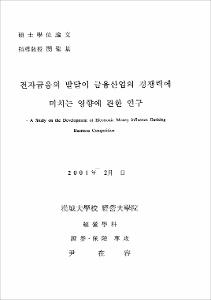전자금융의 발달이 금융산업의 경쟁력에 미치는 영향에 관한 연구
- Files in This Item:
-
-
Download
 000000066034.pdf
기타 데이터 / 2.51 MB / Adobe PDF
000000066034.pdf
기타 데이터 / 2.51 MB / Adobe PDF
-
Items in Repository are protected by copyright, with all rights reserved, unless otherwise indicated.
 000000066034.pdf
기타 데이터 / 2.51 MB / Adobe PDF
000000066034.pdf
기타 데이터 / 2.51 MB / Adobe PDFItems in Repository are protected by copyright, with all rights reserved, unless otherwise indicated.